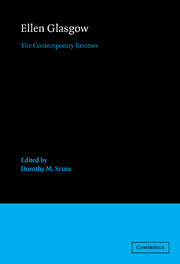Book contents
- Frontmatter
- Contents
- Series Editor's Preface
- Preface
- Acknowledgments
- Introduction
- The Descendant (1897)
- Phases of an Inferior Planet (1898)
- The Voice of the People (1900)
- The Battle-Ground (1902)
- The Freeman and Other Poems (1902)
- The Deliverance (1904)
- The Wheel of Life (1906)
- The Ancient Law (1908)
- The Romance of a Plain Man (1909)
- The Miller of Old Church (1911)
- Virginia (1913)
- Life and Gabriella (1916)
- The Builders (1919)
- One Man in His Time (1922)
- The Shadowy Third and Other Stories (1923)
- Barren Ground (1925)
- The Romantic Comedians (1926)
- They Stooped to Folly (1929)
- The Sheltered Life (1932)
- The Old Dominion Edition of the Works of Ellen Glasgow (1929-33)
- Vein of Iron (1935)
- The Virginia Edition of the Works of Ellen Glasgow (1938)
- In This Our Life (1941)
- A Certain Measure (1943)
- Index
Life and Gabriella (1916)
Published online by Cambridge University Press: 04 May 2010
- Frontmatter
- Contents
- Series Editor's Preface
- Preface
- Acknowledgments
- Introduction
- The Descendant (1897)
- Phases of an Inferior Planet (1898)
- The Voice of the People (1900)
- The Battle-Ground (1902)
- The Freeman and Other Poems (1902)
- The Deliverance (1904)
- The Wheel of Life (1906)
- The Ancient Law (1908)
- The Romance of a Plain Man (1909)
- The Miller of Old Church (1911)
- Virginia (1913)
- Life and Gabriella (1916)
- The Builders (1919)
- One Man in His Time (1922)
- The Shadowy Third and Other Stories (1923)
- Barren Ground (1925)
- The Romantic Comedians (1926)
- They Stooped to Folly (1929)
- The Sheltered Life (1932)
- The Old Dominion Edition of the Works of Ellen Glasgow (1929-33)
- Vein of Iron (1935)
- The Virginia Edition of the Works of Ellen Glasgow (1938)
- In This Our Life (1941)
- A Certain Measure (1943)
- Index
Summary
Mary Katherine Reely, “Excellent Novels of Married Life Problems,” Publishers' Weekly, 89 (15 January 1916), 187–8
Henry Sydnor Harrison in one of his novels has said that there is nothing more remarkable in the present day than the “revolt against chivalry's old home and seat.” That this revolt is serious on the part of the South's leading novelists at least is certain, as books by Mr. Harrison himself, Mr. Johnston, and Miss Ellen Glasgow go to show. This is Miss Glasgow's second novel on the theme. The first was Virginia, published three years ago.
Gabriella Mary of this story is not at all a radical revolutionist, although she is the antithesis of the gentle Virginia. Indeed to the end of her career, or for so much of it as we are permitted to follow, she is never quite free from the traditions to which she was bred. The characteristic thing about Gabriella is that she refuses to be a victim. Gabriella's mother, eking out a limited income with gentle needlework and reverencing the imaginary figure that in the sixteen years of her widowhood had been built up as the memory of her husband, is a victim. Her sister Jane, married to charming and faithless Charley Gracey, is a victim:
“Poor Jane Gracey,” as she was generally called, had wasted the last ten years in a futile effort to hide the fact of an unfortunate marriage beneath an excessively cheerful manner….
It is with this none too happy example before her that the young Gabriella declares that she can manage her own life. She begins to do so by entering the millinery department at Brandywine & Plummer's to learn how to earn a living.
- Type
- Chapter
- Information
- Ellen GlasgowThe Contemporary Reviews, pp. 173 - 188Publisher: Cambridge University PressPrint publication year: 1992
- 1
- Cited by



